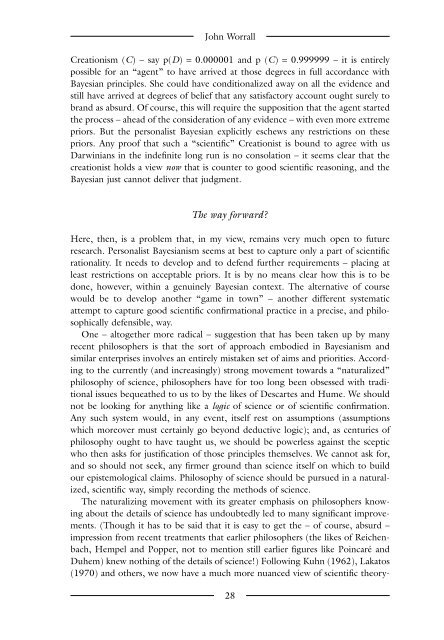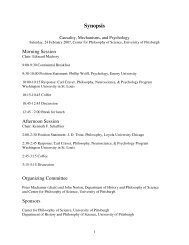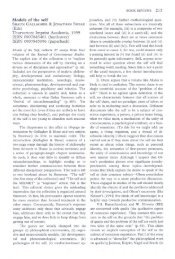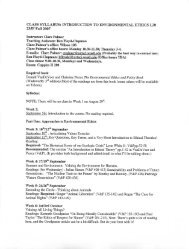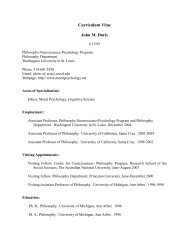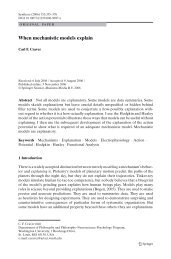The Blackwell Guide to the Philosophy of Science - The Department ...
The Blackwell Guide to the Philosophy of Science - The Department ...
The Blackwell Guide to the Philosophy of Science - The Department ...
Create successful ePaper yourself
Turn your PDF publications into a flip-book with our unique Google optimized e-Paper software.
John Worrall<br />
Creationism (C) – say p(D) = 0.000001 and p (C) = 0.999999 – it is entirely<br />
possible for an “agent” <strong>to</strong> have arrived at those degrees in full accordance with<br />
Bayesian principles. She could have conditionalized away on all <strong>the</strong> evidence and<br />
still have arrived at degrees <strong>of</strong> belief that any satisfac<strong>to</strong>ry account ought surely <strong>to</strong><br />
brand as absurd. Of course, this will require <strong>the</strong> supposition that <strong>the</strong> agent started<br />
<strong>the</strong> process – ahead <strong>of</strong> <strong>the</strong> consideration <strong>of</strong> any evidence – with even more extreme<br />
priors. But <strong>the</strong> personalist Bayesian explicitly eschews any restrictions on <strong>the</strong>se<br />
priors. Any pro<strong>of</strong> that such a “scientific” Creationist is bound <strong>to</strong> agree with us<br />
Darwinians in <strong>the</strong> indefinite long run is no consolation – it seems clear that <strong>the</strong><br />
creationist holds a view now that is counter <strong>to</strong> good scientific reasoning, and <strong>the</strong><br />
Bayesian just cannot deliver that judgment.<br />
<strong>The</strong> way forward?<br />
Here, <strong>the</strong>n, is a problem that, in my view, remains very much open <strong>to</strong> future<br />
research. Personalist Bayesianism seems at best <strong>to</strong> capture only a part <strong>of</strong> scientific<br />
rationality. It needs <strong>to</strong> develop and <strong>to</strong> defend fur<strong>the</strong>r requirements – placing at<br />
least restrictions on acceptable priors. It is by no means clear how this is <strong>to</strong> be<br />
done, however, within a genuinely Bayesian context. <strong>The</strong> alternative <strong>of</strong> course<br />
would be <strong>to</strong> develop ano<strong>the</strong>r “game in <strong>to</strong>wn” – ano<strong>the</strong>r different systematic<br />
attempt <strong>to</strong> capture good scientific confirmational practice in a precise, and philosophically<br />
defensible, way.<br />
One – al<strong>to</strong>ge<strong>the</strong>r more radical – suggestion that has been taken up by many<br />
recent philosophers is that <strong>the</strong> sort <strong>of</strong> approach embodied in Bayesianism and<br />
similar enterprises involves an entirely mistaken set <strong>of</strong> aims and priorities. According<br />
<strong>to</strong> <strong>the</strong> currently (and increasingly) strong movement <strong>to</strong>wards a “naturalized”<br />
philosophy <strong>of</strong> science, philosophers have for <strong>to</strong>o long been obsessed with traditional<br />
issues bequea<strong>the</strong>d <strong>to</strong> us <strong>to</strong> by <strong>the</strong> likes <strong>of</strong> Descartes and Hume. We should<br />
not be looking for anything like a logic <strong>of</strong> science or <strong>of</strong> scientific confirmation.<br />
Any such system would, in any event, itself rest on assumptions (assumptions<br />
which moreover must certainly go beyond deductive logic); and, as centuries <strong>of</strong><br />
philosophy ought <strong>to</strong> have taught us, we should be powerless against <strong>the</strong> sceptic<br />
who <strong>the</strong>n asks for justification <strong>of</strong> those principles <strong>the</strong>mselves. We cannot ask for,<br />
and so should not seek, any firmer ground than science itself on which <strong>to</strong> build<br />
our epistemological claims. <strong>Philosophy</strong> <strong>of</strong> science should be pursued in a naturalized,<br />
scientific way, simply recording <strong>the</strong> methods <strong>of</strong> science.<br />
<strong>The</strong> naturalizing movement with its greater emphasis on philosophers knowing<br />
about <strong>the</strong> details <strong>of</strong> science has undoubtedly led <strong>to</strong> many significant improvements.<br />
(Though it has <strong>to</strong> be said that it is easy <strong>to</strong> get <strong>the</strong> – <strong>of</strong> course, absurd –<br />
impression from recent treatments that earlier philosophers (<strong>the</strong> likes <strong>of</strong> Reichenbach,<br />
Hempel and Popper, not <strong>to</strong> mention still earlier figures like Poincaré and<br />
Duhem) knew nothing <strong>of</strong> <strong>the</strong> details <strong>of</strong> science!) Following Kuhn (1962), Laka<strong>to</strong>s<br />
(1970) and o<strong>the</strong>rs, we now have a much more nuanced view <strong>of</strong> scientific <strong>the</strong>ory-<br />
28


